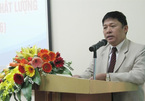Vu Thi Phuong Anh, QA director of Nguyen Hoang Education Group, said one of the biggest problems of education accreditation centers in Vietnam is the lack of independence.

“Many scholars, experts and researchers express doubts about the independence of accreditation centers in Vietnam,” Anh said.
Nominally, Vietnam’s accreditation system operates in accordance with the US accreditation model. However, the system is completely under the control of the Ministry of Education and Training (MOET).
The ministry controls everything: it sets accreditation criteria and standards, and accreditation methods; it grants licenses to accreditation centers and sets accreditation plans.
| Nominally, Vietnam’s accreditation system operates in accordance with the US accreditation model. However, the system is completely under the control of the Ministry of Education and Training |
“All these things are determined by an arm of the ministry – the Department of Educational Quality Management,” Anh said.
A university lecturer in Hanoi said: "Once accreditation centers are put under the control of university presidents and operate with the money allocated by universities, they cannot be independent."
“It is the lack of independence which has negative impact on the process and effectiveness of the accreditation of higher education establishments,” he said.
Anh said that the reward and punishment policies are not clear and the regulations are not applied in practice.
Under the laws, regular accreditation is mandatory for all higher education establishments. Universities must have public accreditation results to ensure accountability and transparency.
However, after being accredited, "whether a university will be more autonomous, freer and have more budget to maintain quality" is still in doubt.
Anh went on to note that the accreditation system lacks stability.
The system is built with international support with models existing in some developed countries. It bears the hallmarks of the US model, with some aspects of the European (Dutch) model.
The instability can be seen in the continual changes in criteria for accreditation and the way of making assessments.
With the first set of standards, built m with the support of many international specialists, there were three levels of accreditation. After applying standards for three years at 20 schools, the standards were adjusted as suggested by experts. There were only two levels.
However, the adjustment could not satisfy experts and the standards have once again been adjusted. This time, AUN-QA standards are applied with major differences from the old standards. There are now seven levels for assessment.
Meanwhile, when VietNamNet raised a question about the independence of accreditation centers, Nguyen Hoi Nghia, director of the Hanoi National University, affirmed that the centers are independent in operation. The centers are established by MOET, their directors are appointed by MOET and they have to operate in accordance with the regulations set by MOET.
Thanh Lich

Education quality accreditation should operate independently
PhD Pham Xuan Thanh, former deputy director of the Department of Testing and Quality Assessment, under the Ministry of Education and Training, talks on the need to let the education quality agency work independently.

Education Ministry vows to step up university accreditation
To date, only 144 out of thousands of training programs and 121 out of 268 higher education establishments have been recognized as meeting standards.
 Most higher education accreditation centers belong to universities, with heavy reliance in finance and personnel.
Most higher education accreditation centers belong to universities, with heavy reliance in finance and personnel.